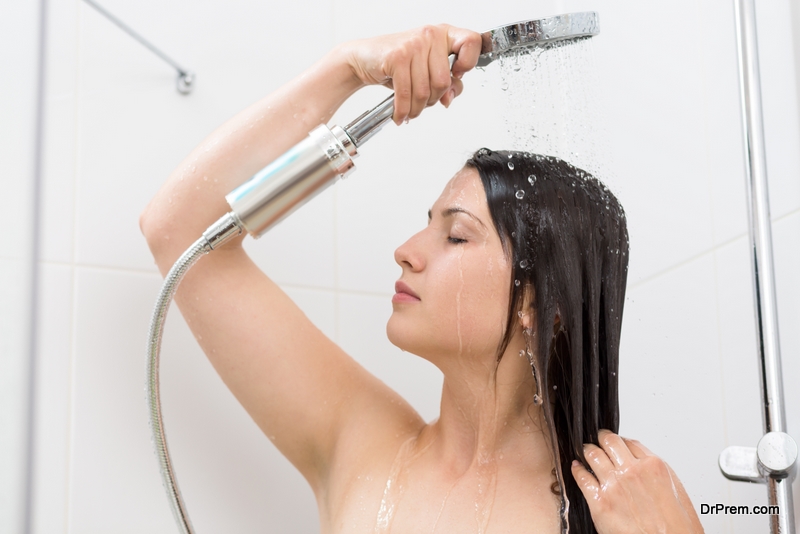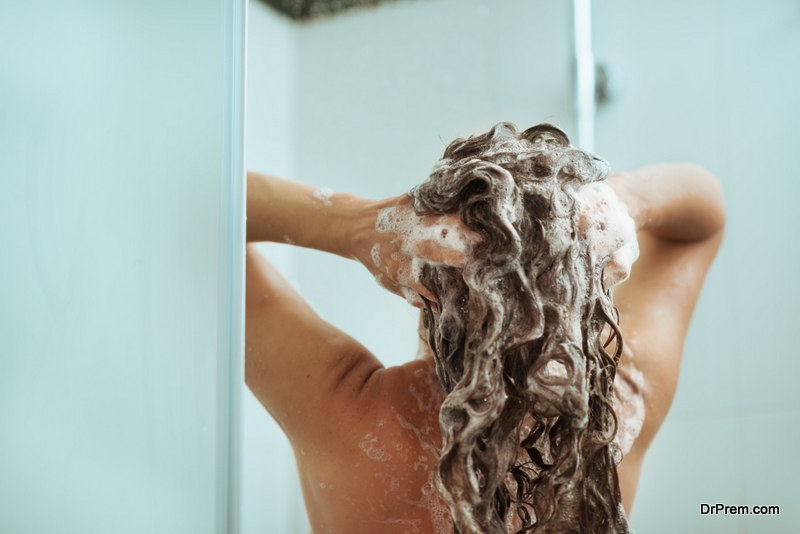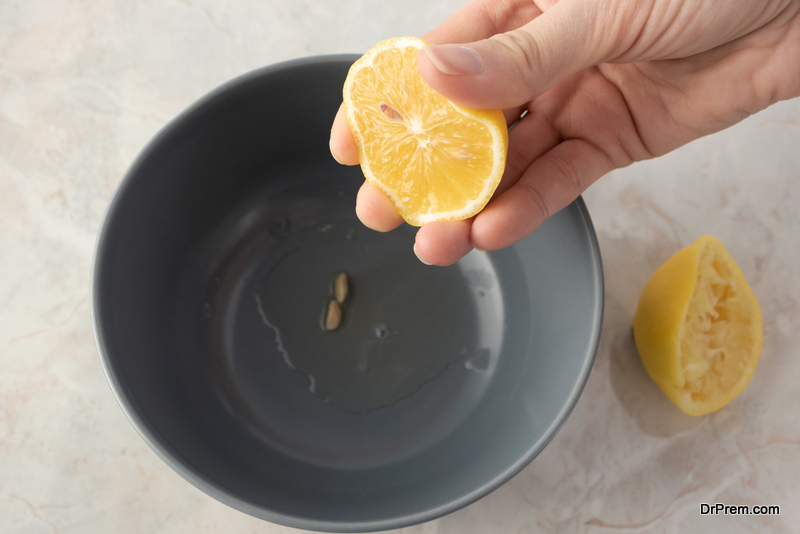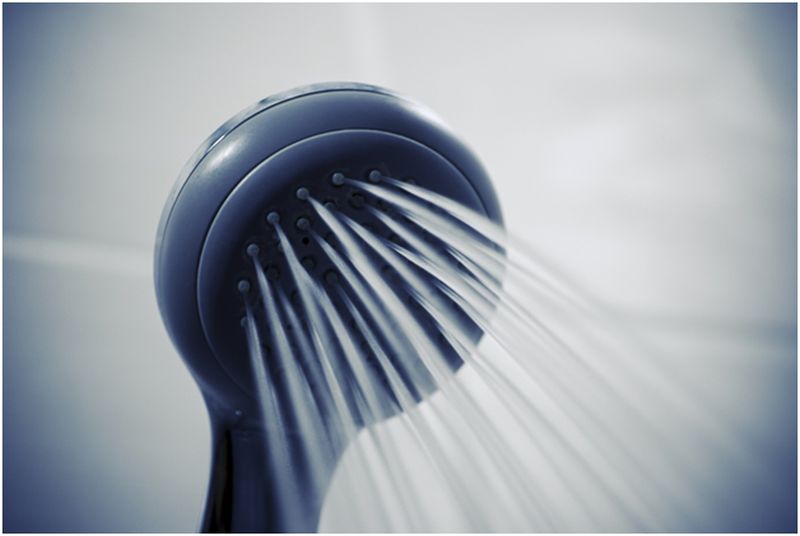For most of us, water is just water. We turn on the faucet and there it is. End of story. The truth is that there are two different types of water, and there really is a difference. You may have heard people debate the pros and cons of hard vs soft water, or complain about how hard water is damaging their appliances and staining their clothes, but did you know that hard water also has a big effect on your skin, nails, and hair?
Signs of Hard Water
If you notice white scaling on your faucets, soap scum on your bath, mineral residue on your plates and cutlery, or a film on your skin or clothes, the chances are you have hard water. Despite having some health benefits (hard water contains magnesium, calcium, and other nutrients which can be beneficial to the body), it’s important to know the negative effects of hard water. Aside from staining your appliances and destroying your whites, hard water can wreak havoc on your skin, hair, and nails.
1. Skin
 Due to its hard nature, it changes the natural pH balance in your skin, which can lead to skin irritation, bumpy patches, dryness, and eczema. As well as causing irritation and a pH imbalance, hard water can also clog your pores. Since hard water doesn’t rinse away soap scum and lather well like soft water, residue from your soap and shampoo can remain on the skin, clogging pores and causing spots.
Due to its hard nature, it changes the natural pH balance in your skin, which can lead to skin irritation, bumpy patches, dryness, and eczema. As well as causing irritation and a pH imbalance, hard water can also clog your pores. Since hard water doesn’t rinse away soap scum and lather well like soft water, residue from your soap and shampoo can remain on the skin, clogging pores and causing spots.
2. Nails
Over time, hard water can also cause damage to nails, breaking them down and destroying the nail bed. This is because hard water is made up of different minerals that damage the keratin layers in your nails. Hard water also dries out the skin, leaving nails and the nail bed brittle and unhealthy. With prolonged exposure to hard water, the nail beds can dry out, preventing growth and leaving the nails weak, discolored, and easily broken.
3. Hair
 One of the telltale signs that you have hard water is the noticeable effect it has on your hair. Hard water is made up of minerals including calcium, magnesium, and silica. The presence of these minerals makes it hard to rinse your hair properly, leading to product buildup. Buildup in the hair can leave it feeling like it’s covered in a film, even after washing and it will likely look dull and lifeless. Another common issue is that people who wash their hair in hard water and are unable to rinse it thoroughly tend to wash their hair more often or use more product which is not only costly, but it only makes the issue worse. Overwashing hair will damage it further and weaken your hair follicles.
One of the telltale signs that you have hard water is the noticeable effect it has on your hair. Hard water is made up of minerals including calcium, magnesium, and silica. The presence of these minerals makes it hard to rinse your hair properly, leading to product buildup. Buildup in the hair can leave it feeling like it’s covered in a film, even after washing and it will likely look dull and lifeless. Another common issue is that people who wash their hair in hard water and are unable to rinse it thoroughly tend to wash their hair more often or use more product which is not only costly, but it only makes the issue worse. Overwashing hair will damage it further and weaken your hair follicles.
The calcium, magnesium, and silica in hard water dry the hair and scalp, causing breakage, thinning, dandruff, and an irritated scalp. If your hair is color-treated, you’ll also notice that the color goes brassy or a greenish color, or fades quickly, meaning you’ll have to color it more often and damage your hair even more. In severe cases, such as in people who suffer from eczema or psoriasis, scalp irritation caused by hard water can eventually lead to hair loss. A study of the effects of hard water on the hair showed that hard water leads to hair breakage, which can, in turn, lead to hair thinning.
If your hair is showing signs of distress thanks to hard water exposure, don’t worry, the effects can be reversed with some TLC. These five hacks will have your locks back to feeling luscious in no time.
4. Get a water softening shower head
The ideal way to counteract the effects of hard water is to install a water softener. However, this option may be a bit too costly for many people. A more cost-effective option is to get water softening shower head that will remove the minerals before your skin, hair, and nails are affected. The shower heads contain a carbon cartridge that removes traces of minerals, turning your hard water into soft water and allowing you to rinse thoroughly without worrying about buildup or dryness.
5. Use a clarifying shampoo
 If hard water has left a mineral buildup in your hair, try adding a clarifying shampoo to your hair routine. Look out for a clarifying shampoo specifically designed to combat hard water buildup and use it once a week to breathe some life back into your locks.
If hard water has left a mineral buildup in your hair, try adding a clarifying shampoo to your hair routine. Look out for a clarifying shampoo specifically designed to combat hard water buildup and use it once a week to breathe some life back into your locks.
6. Treat your hair with a hair mask
Hair that has been exposed to hard water is likely to be dry, damaged, and thirsty for moisture. Add a nourishing hair mask or treatment to your hair routine and apply once or twice a week, depending on the thickness and dryness of your hair. Massage it in well and leave for at least thirty minutes for the best results.
If your hair is really dry and damaged, consider a salon treatment such as Olaplex to nourish it from the inside out or make your own natural hair mask using ingredients from your kitchen like olive oil, eggs, honey, banana, or avocado. Minerals in hard water break down keratin in nails and hair, so look out for a mask with keratin to really restore your hair.
Don’t forget, hard water really dries out the scalp, so make sure that you massage it well and add a nourishing mask or oil to combat dryness and irritation. For finer hair, try to find a light mask that won’t weigh down your hair even more. In between hair masks, use a leave-in conditioner with a low pH to soften the hair and lock in moisture.
7. Make a rinse to remove buildup
 When rescuing your hair from hard water damage, the scalp is key. Healthy scalp equals healthy hair. As we’ve seen in this article, hard water throws off your scalp’s natural pH level, causing dryness and irritation. Try making your own natural hair rinse to lower your hair’s pH and nourish it with vitamin B and C.
When rescuing your hair from hard water damage, the scalp is key. Healthy scalp equals healthy hair. As we’ve seen in this article, hard water throws off your scalp’s natural pH level, causing dryness and irritation. Try making your own natural hair rinse to lower your hair’s pH and nourish it with vitamin B and C.
To make your own hair rinse, mix together a teaspoon of apple cider vinegar, a teaspoon of lemon juice, and a cup of water and rinse your hair with it after shampooing. Work the solution through your hair for about a minute, then rinse thoroughly with cold water. This rinse will remove build up and grease, clarify, balance pH levels, and seal the cuticle however, vinegar can also be drying to your hair over time, so don’t overdo it. Limit rinses to a few times a month and always follow up with a deep conditioning mask.
8. Get your vitamins and minerals in
Make sure your hair shines from the inside out by getting all the vitamins and minerals it needs. Eat a balanced diet and try adding some supplements to your diet to give your hair an added boost. Vitamins such as vitamin B7 (biotin), vitamin C, vitamin D, and zinc can all help restore your hair’s shine and vitality naturally. It’s always best to get your vitamins and minerals from food, but with our busy lifestyles, sometimes we just need a helping hand.
Key Takeaways
While the health effects of hard water are in no way life threatening or anything to cause you unnecessary concern, they can build up over time. If you’re noticing the adverse effects of hard water on your hair, skin, and nails, try the steps mentioned in this article to reverse the damage and get your skin, hair, and nails back to tip top condition.
Article Submitted By Community Writer




